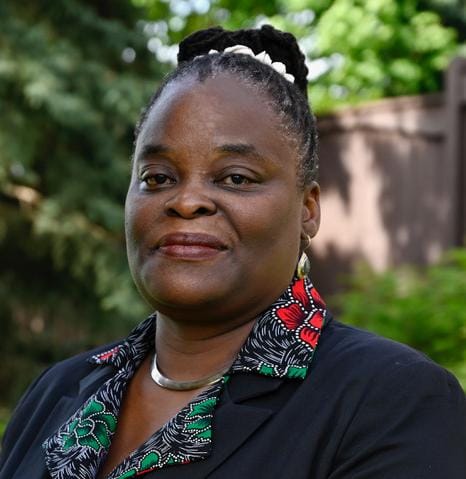Prof. Roberta K. Timothy recognized with Early Teaching Award
May 28/2024
Early Career Teaching Award recipient Prof. Roberta K. Timothy encourages students to think critically and consider diverse perspectives in their studies.
By Elaine Smith
Prof. Roberta K. Timothy, the inaugural program director of DLSPH’s Master of Public Health: Black Health program and the Black Health Lead, was named one of five U of T professors to receive the 2023-2024 Cheryl Regehr Early Career Teaching Award. The annual awards, named for the university’s former provost, are given to faculty members who “demonstrate an exceptional commitment to student learning, pedagogical engagement and teaching innovation.” The annual awards, named for the university’s former provost, are given to faculty members who “demonstrate an exceptional commitment to student learning, pedagogical engagement and teaching innovation.”

Photo credit: Jim Rankin from Toronto Star.
“I’m totally honoured that a colleague recognized my teaching pedagogy and nominated me, and then to get the award – it’s a real honour to be acknowledged in this way,” says Timothy. “Since I did my PhD, second Master’s and my post-doctoral work at U of T, it makes the award even more special. I’ve come full circle.”
Timothy says she is passionate about decolonizing healthcare and loves “the ability to support people as they learn new things and unlearn others.
“I love seeing when students get it, that there are different ways of examining issues, realizing that they can break the box they’re in and think in ways that are more flexible and creative. Helping people do that feels like a superpower.”
She enjoys engaging with her students and is eager to support them in their learning journeys. “I want to help create a world without oppression, a world where wellness and healing are prioritized,” Timothy says. “There is oppression and pain that happens in healthcare for Black, Indigenous, and purposefully marginalized populations; my students are also impacted as they come from communities that have experienced harm. I foster a learning environment where empathy and support for my students and their experiences are integral.”
As a self-described “Black feminist activist,” she believes that it is important to incorporate wellness into her teaching.
As a lifelong learner, she is always incorporating new tools into her pedagogy.
“COVID-19 forced us online and I have embraced it,” she says. “Now, I’m curious about artificial intelligence. I want to see how it will impact us. In the future, I’ll bring more technical assets to my class so my students can express themselves differently, always through an intersectional, anti-racist, anti-oppression and decolonial lens.
“The best teachers tweak their lessons and styles all the time; nothing is set in stone.”
Timothy likes to share what she has learned from mentors, ancestors, and people from all walks of life, prioritizing African/Black epistemologies and global Indigenous knowledges.
“All of these teachings have brought me to where I am,” she says. “Now, I’ve created a program that I wish I could have enrolled in when I was a student.”